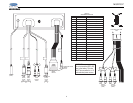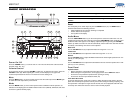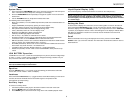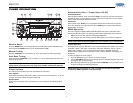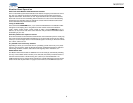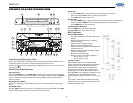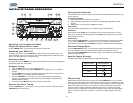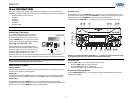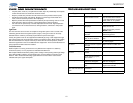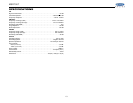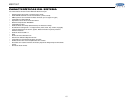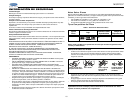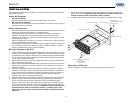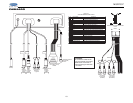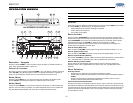
MSR7007
12
CARE AND MAINTENANCE
• If liquids (coffee, soda, etc.) are spilled on the radio, wipe it dry immediately. Some liquids
contain minerals that can corrode the electronic circuits.
• Keep the product away from dust and dirt, which can cause premature wear of parts.
• Handle the product gently and carefully. Dropping it can damage circuit boards and
cases, and can cause the product to work improperly.
• Wipe the product with a dampened cloth occasionally to keep it looking new. Do not use
harsh chemicals, cleaning solvents, or strong detergents to clean the product.
• Use and store the product only in normal temperature environments. High temperature
can shorten the life of electronic devices, damage batteries, and distort or melt plastic
parts.
Ignition
The most common source of noise in reception is the ignition system. This is a result of the
radio being placed close to the ignition system (engine). This type of noise can be easily
detected because it will vary in intensity of pitch with the speed of the engine.
Usually, the ignition noise can be suppressed considerably by using a radio suppression type
high voltage ignition wire and suppressor resistor in the ignition system. (Most vessels employ
this wire and resistor but it may be necessary to check them for correct operation.) Another
method of suppression is the use of additional noise suppressors. These can be obtained from
most professional mobile electronics retailers.
Interference
Radio reception in a moving environment is very different from reception in a stationary
environment (home). It is very important to understand the difference.
AM reception will deteriorate when passing under a bridge or when passing under high voltage
lines. Although AM is subject to environmental noise, it has the ability to received at great
distance. This is because broadcasting signals follow the curvature of the earth and are
reflected back by the upper atmosphere.
TROUBLESHOOTING
Symptom Cause Solution
No power The vessel’s +12V switched
power source is not on
If the radio power supply is prop-
erly connected to the vessel’s
+12V switched power source ter-
minal, switch to “on” position
The fuse is blown Replace the fuse
Disc cannot be loaded or
ejected
Presence of CD disc inside
the player
Remove the disc in the player and
insert the new one
If disc will not eject, press the
RESET button
Inserting the disc in reverse
direction
Insert the compact disc with the
label facing upward
Compact disc is extremely
dirty or disc is defective
Clean the disc or try to play a new
one
Condensation Leave the player off for an hour or
so, then try again
No sound Volume is too low or system
is muted
Adjust volume to audible level
Wiring is not properly con-
nected
Check wiring connections
The operation keys do
not work
Front panel not properly
closed
Close front panel
The built-in microcomputer
is not operating properly
due to noise
Press the RESET button
Sound skips The installation angle is
more than 30 degrees
Adjust the installation angle to
less than 30 degrees
The disc is dirty or defec-
tive.
Clean the disc and try to play
again or use new disc
Cannot tune to radio sta-
tion, auto-seek does not
work
The antenna cable is not
connected
Check antenna cable
The signals are too weak Select a station manually



